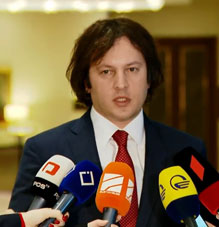
Georgian Dream Criticizes U.S. Embassy and Foreign Donors
By Liza Mchedlidze
Friday, February 7, 2025
The Georgian Dream (GD) party has raised concerns about the actions of the U.S. Embassy in Georgia, USAID, and other foreign donors. GD's Prime Minister Irakli Kobakhidze, during an official visit to Kazakhstan, said that these organizations were working in a coordinated manner that he believes goes against the interests of Georgia.
"In Georgia, the U.S. Embassy and USAID, along with other institutions, have acted in a coordinated way that does not align with the interests of the Georgian people and state," Kobakhidze told journalists. He expressed hope that the new U.S. administration would improve relations and lead to a change in the approach of these foreign organizations.
On February 6, GD Parliamentary Majority Leader Mamuka Mdinaradze also announced plans for new legislation aimed at regulating civil society organizations (CSOs) and media. This includes a proposed law to replace the current Foreign Agents Law, which Mdinaradze described as "identical" to the U.S. Foreign Agents Registration Act (FARA). However, previous claims about the law being similar to FARA have been debated by legal experts.
The GD party's criticism of U.S. and European donors increased following U.S. President Donald Trump's executive order, which temporarily suspended foreign aid. The order criticized foreign aid programs, suggesting that they may promote ideas that do not align with stable international relations. GD officials, including Shalva Papuashvili, supported this decision, arguing that foreign aid has sometimes been used to influence domestic affairs in other countries.
Papuashvili also raised questions about the European Endowment for Democracy (EED), a European organization that provides grants for projects in Georgia. He called for greater transparency regarding the funding of these organizations.
The announcement of new legislation coincides with ongoing protests in Georgia, where demonstrators are calling for new elections and the release of detained protesters. These protests have focused on the country's foreign policy, with many advocating for a stronger pro-EU stance. Kobakhidze reiterated his belief that foreign-funded NGOs have been involved in promoting political change, but emphasized that this situation poses challenges to the country's sovereignty.

